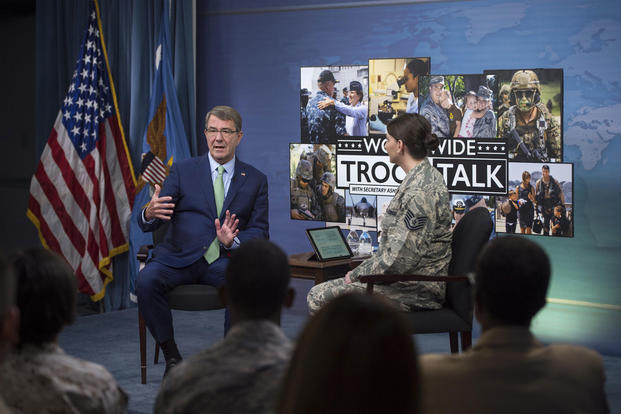Defense Secretary Ashton Carter told troops Wednesday the U.S. military will be heavily engaged in the Mideast long after the Islamic State of Iraq and Syria is defeated.
From Baghdad, Army Staff Sgt. Rory Radtke, a combat engineer with the 101st Airborne Division, asked whether U.S. troops would stay in the region indefinitely, much as they have in South Korea.
Carter did not respond directly to the comparison to South Korea, where the U.S. has maintained a presence for more than 60 years, but said of the Mideast, "We're going to be in that region for a long time. You bet we'll be in your region."
The secretary took the question during an event billed as a "Worldwide Troop Talk" with service members at the Pentagon, bases around the globe and aboard the Navy's newest destroyer, the futuristic Zumwalt.
"You're what I wake up for every morning," he said to his audience before fielding questions from moderator Air Force Tech Sgt. Holly Roberts Davis and others on wide-ranging topics -- from family issues and suicide rates, to cyber defense and the nuclear triad deterrent.
Carter said the Defense Department continues to look for ways "wherever we can be flexible" to relieve the stress of service on military families, particularly dual-service couples. He noted the department expanded paid maternity leave to 12 weeks for women in all services in January. "It was way worth it in terms of retention," he said.
"We are a married force," he said. About 70 percent of officers are married, and about 50 percent of the enlisted ranks, he said. The Defense Department is searching for better ways to help couples balance commitments to family and service, he said.
"To the extent possible," Carter said he wanted to make sure that "those two things do not clash."
From Yokosuka Naval Base in Japan, Religious Program Specialist Petty Officer Second Class Javier Matos said, "There's a lot of talk about veterans suicide," but "we see suicide as a real thing in our active component."
"Suicide prevention is a very big deal to me. The rates are not acceptable," Carter said. "Suicide is preventable -- all the doctors and chaplains will tell you that. The only way you can prevent it is by working together."
The secretary said the Defense Department has increased funding for mental health treatment, and "there should be no stigma attached to getting yourself treated. We've all got to watch out for each other. It doesn't take a big risk to say to somebody, 'Hey, you doing OK?' It's loneliness and isolation that continues to lead them down that path."
From aboard the destroyer Zumwalt, Hull Maintenance Technician First Class Stuart Simpson suggested retention rates would improve if the services did exit surveys on why troops were leaving. Carter agreed: "Yes, we need to do them."
West Point Cadet Adam Cratch wanted to know why the Defense Department doesn't spend more to stop cyber attacks. "We're making big investments, but money isn't key; it's people," Carter said. The military must find ways to attract individuals with the expertise to deal with cyber threats, he said. "It's a people problem more than a money problem."
From Quantico, Virginia, new Marine 2nd Lt. Travis Crane asked about the future of military aviation, and whether he'd be able to realize his dream of flying the F-35 Joint Strike Fighter. Despite its many and well-known problems, Carter said, the F-35 is "really coming along now. You're going to like the F-35."
Several of the questions were about the defense budget and the effects of spending limits on readiness and modernization of the nation's nuclear triad deterrent.
One problem is Congress' failure to give adequate consideration to the priorities set out by the Joint Chiefs, Carter said. "I wish that respect would be shown for the judgment of our leadership."
Carter called the nuclear triad a "bedrock capability. It's always there," as a guarantor of our security and nuclear stability around the world," but "everything gets old and has to be replaced."
The Defense Department is pushing for replacements for the Ohio-class ballistic submarine and modernization of the Minuteman III Intercontinental Ballistic Missiles, he said, and "we're building a new bomber" -- the B-21, newly christened as the "Raider."
"I'm confident that we'll do that," Carter said, but added that Congress "will spend as little as they can."
Near the end of the session, Carter also took a shout-out from movie star Chris Pratt, who is on a USO tour. Pratt wanted to know if "Rambo" is Carter's favorite movie. Carter said he is from Philadelphia, so he likes "Rocky" best.
-- Richard Sisk can be reached at Richard.Sisk@Military.com.



























